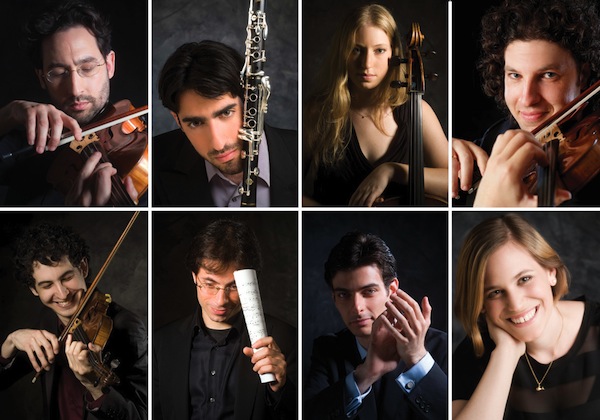Israeli Chamber Project marks ten years with a wide-ranging feast

The Israeli Chamber Project performed Thursday night at the Kaye Playhouse.
The Israeli Chamber Project marked its tenth anniversary Thursday night at Baruch College with a crisp and efficient performance of works spanning more than 175 years — and the newest entry a world premiere serving as a kind of summation of the whole program.
Surrounded by selections from Stravinsky, Ravel, Schumann and Elliot Carter, Israeli composer Gilad Cohen’s Firefly Elegy incorporated many of the musical impulses and evolutions represented by the rest of the works, from romance to tone rows.
Whether Cohen’s piece, which the Israeli Chamber Project commissioned, was more of an exercise than a statement, or an expression of a vision, is a question that confronts a lot of the reference-laden, post-modernist fare of the current era. But Firefly Elegy — arranged for harp, clarinet and string trio — carried itself with an undeniable briskness and a contemporary flair while it also traversed older classical currents and found moments of attractive repose.
The concert opened with four excerpts from Petrushka, Stravinsky’s 1911 ballet symphony about a love-starved puppet with a mind and a disposition of its own. In this sextet arrangement, by Yuval Shapiro, the chamber musicians had to preserve the audacious spirit and bold colors of the original while paring away layers of orchestration.
In this, they largely succeeded. While there is nothing to match full-on Stravinsky, the players bridged the distances between orchestral forces with an intense focus on melodies, pointed rhythmic play and about as much tonal versatility as the instrumentalists — flute, clarinet, piano, harp, violin and cello — could apply without resort to special effects.
The lean arranging and nimble playing sometimes brought out interesting, individual strands of the ballet’s DNA, such as a peculiar, almost medieval strain of music folded into the opening “Shrovetide Fair.” In “Petrushka’s Room,” cellist Michal Korman and violinist Daniel Bard created a strikingly realistic pump-organ tone to accompany the dismal clown’s tragicomic flailing. Pianist Assaff Weisman and harpist Sivan Magen provided a steady, orchestral underlay throughout.
The edited Petrushka sounded stronger in ensemble play than with musicians in isolation, and more assured in its uptempo clamor than in its slower, more solitary moments. But this was still more than a condensed, Reader’s Digest version, providing a playful and imaginative retooling of the original ballet.
Ravel’s Introduction & Allegro, a 1905 piece for harp, flute, clarinet and string quartet required no workarounds because it was expressly written for a chamber group — harp in particular.
Magen made impressive work of the cadenza, placing bell-like harmonics atop swells and trills, and sounding like an orchestra of one. But for all the technical fireworks, Ravel, more than any composer represented Thursday, seemed to bring out the ensemble’s capacity for soulfulness and melancholy best as they passed the work’s arcing theme around, concerto grosso style.
The lushness of Ravel was a stark contrast to the piece that preceded it: Elliott Carter’s Esprit rude/Esprit doux, from 1984. Written as a whimsical birthday wish to Pierre Boulez, using notes as alphabetical code, this short burst of wind-instrument chatter effectively positioned clarinetist Tibi Cziger and flutist Guy Eshed as adversaries one moment and companions the next.
The winds were absent for the concert’s second half, which was given over entirely to Schumann’s 1842 Piano Quintet in E-flat Major, Op. 44, the oldest piece on the program.
The Piano Quintet’s most durable section is arguably is its second, a funereal march — somber but poised — whose theme the chamber players shared and elaborated on beautifully. The elegance with which Schumann alternated moods and ornamented his music is textbook composition, and perhaps composers today could do with more of Schumann’s symmetry and wholeness of harmony and melody. But on this occasion it was more rewarding — and felt more relevant — to hear violinist Carmit Zorit digging into Ravel or Dimitri Murrath strumming his viola like a guitar in Cohen’s Firefly Elegy.
Baruch Performing Arts Center’s 2017-2018 classical season continues with “Cantata Profana: Stravinsky Salon” March 23. baruch.cuny.edu; 212-352-3101.






